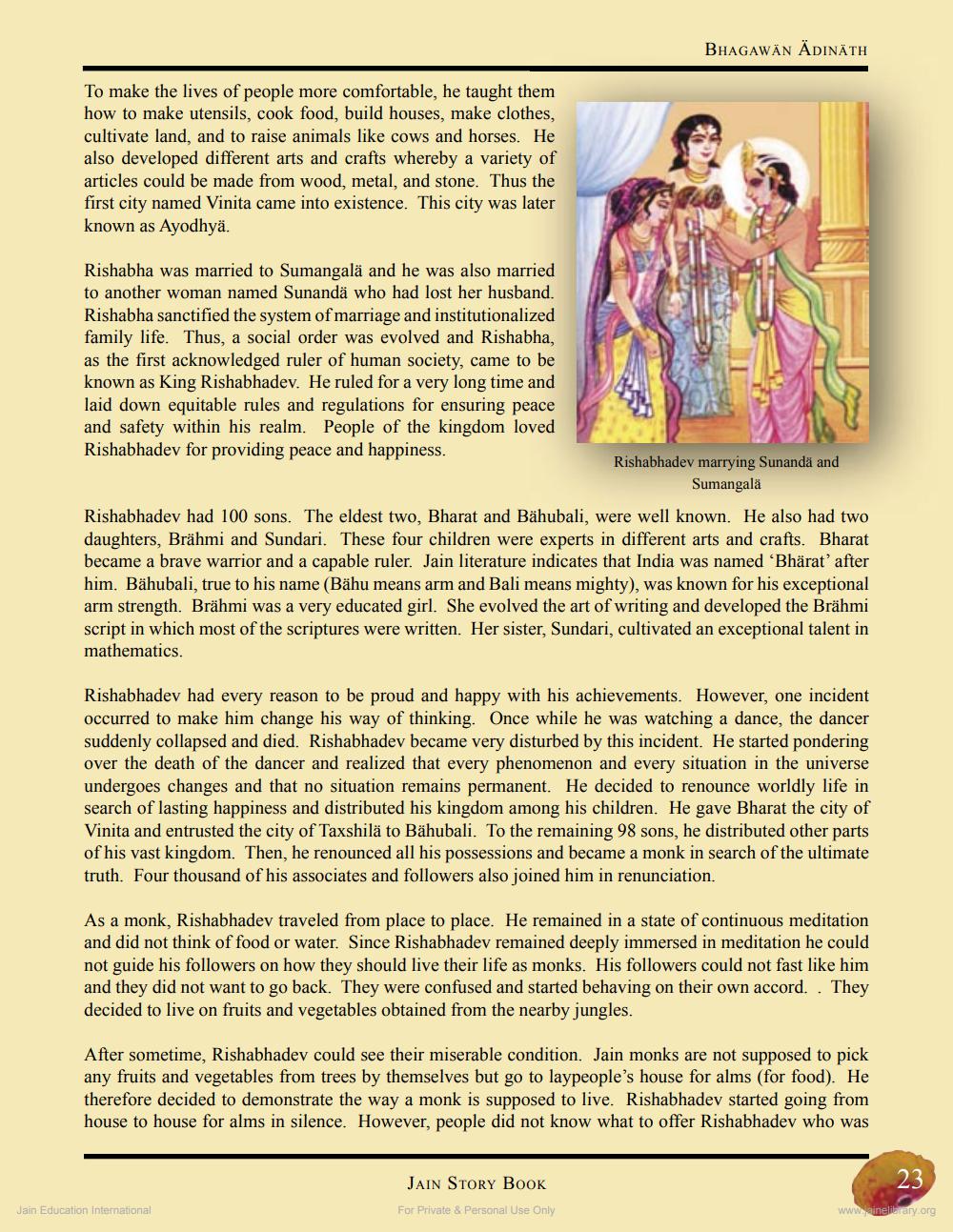________________
To make the lives of people more comfortable, he taught them how to make utensils, cook food, build houses, make clothes, cultivate land, and to raise animals like cows and horses. He also developed different arts and crafts whereby a variety of articles could be made from wood, metal, and stone. Thus the first city named Vinita came into existence. This city was later known as Ayodhya.
Rishabha was married to Sumangalä and he was also married to another woman named Sunandä who had lost her husband. Rishabha sanctified the system of marriage and institutionalized family life. Thus, a social order was evolved and Rishabha, as the first acknowledged ruler of human society, came to be known as King Rishabhadev. He ruled for a very long time and laid down equitable rules and regulations for ensuring peace and safety within his realm. People of the kingdom loved Rishabhadev for providing peace and happiness.
BHAGAWAN ÄDINÄTH
Rishabhadev had 100 sons. The eldest two, Bharat and Bähubali, were well known. He also had two daughters, Brähmi and Sundari. These four children were experts in different arts and crafts. Bharat became a brave warrior and a capable ruler. Jain literature indicates that India was named 'Bharat' after him. Bähubali, true to his name (Bähu means arm and Bali means mighty), was known for his exceptional arm strength. Brähmi was a very educated girl. She evolved the art of writing and developed the Brähmi script in which most of the scriptures were written. Her sister, Sundari, cultivated an exceptional talent in mathematics.
Rishabhadev marrying Sunanda and Sumangala
Rishabhadev had every reason to be proud and happy with his achievements. However, one incident occurred to make him change his way of thinking. Once while he was watching a dance, the dancer suddenly collapsed and died. Rishabhadev became very disturbed by this incident. He started pondering over the death of the dancer and realized that every phenomenon and every situation in the universe undergoes changes and that no situation remains permanent. He decided to renounce worldly life in search of lasting happiness and distributed his kingdom among his children. He gave Bharat the city of Vinita and entrusted the city of Taxshilä to Bähubali. To the remaining 98 sons, he distributed other parts of his vast kingdom. Then, he renounced all his possessions and became a monk in search of the ultimate truth. Four thousand of his associates and followers also joined him in renunciation.
As a monk, Rishabhadev traveled from place to place. He remained in a state of continuous meditation and did not think of food or water. Since Rishabhadev remained deeply immersed in meditation he could not guide his followers on how they should live their life as monks. His followers could not fast like him and they did not want to go back. They were confused and started behaving on their own accord. . They decided to live on fruits and vegetables obtained from the nearby jungles.
Jain Education International
After sometime, Rishabhadev could see their miserable condition. Jain monks are not supposed to pick any fruits and vegetables from trees by themselves but go to laypeople's house for alms (for food). He therefore decided to demonstrate the way a monk is supposed to live. Rishabhadev started going from house to house for alms in silence. However, people did not know what to offer Rishabhadev who was
JAIN STORY BOOK For Private & Personal Use Only
23
www.ainelibrary.org




